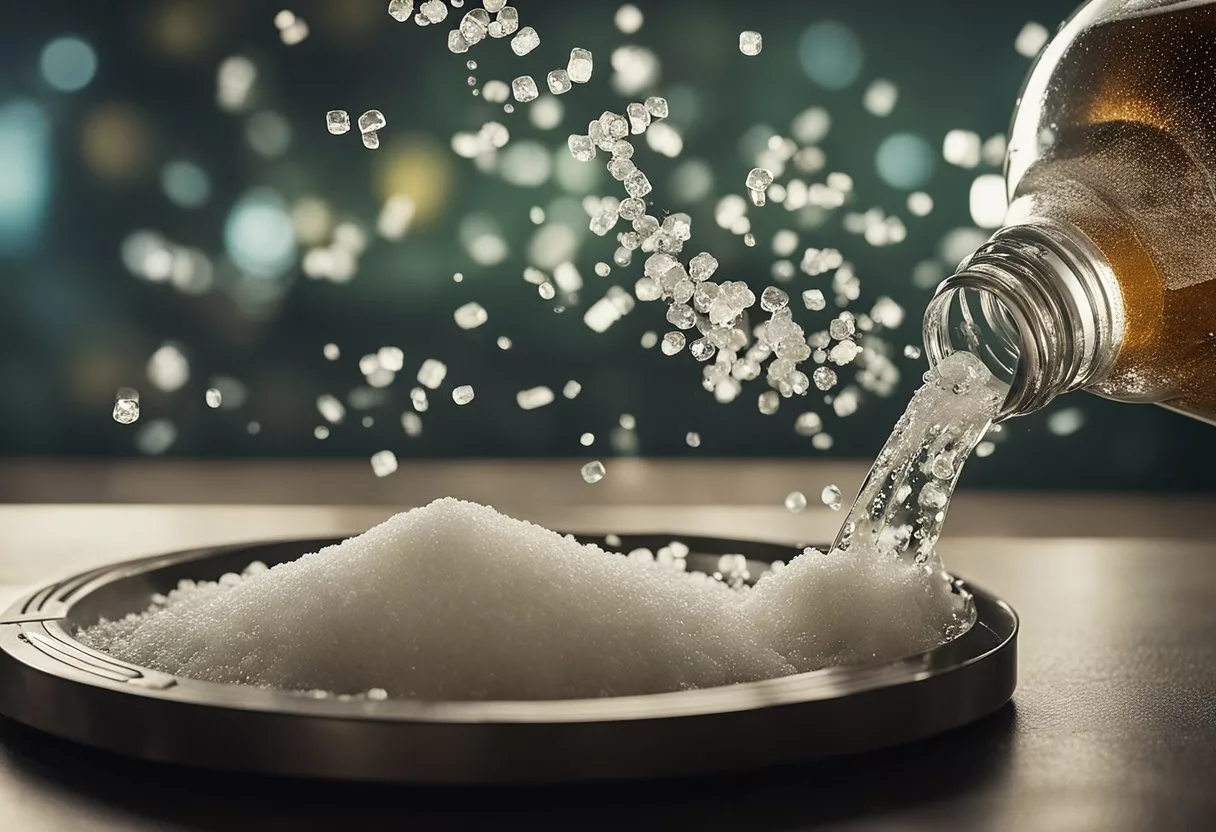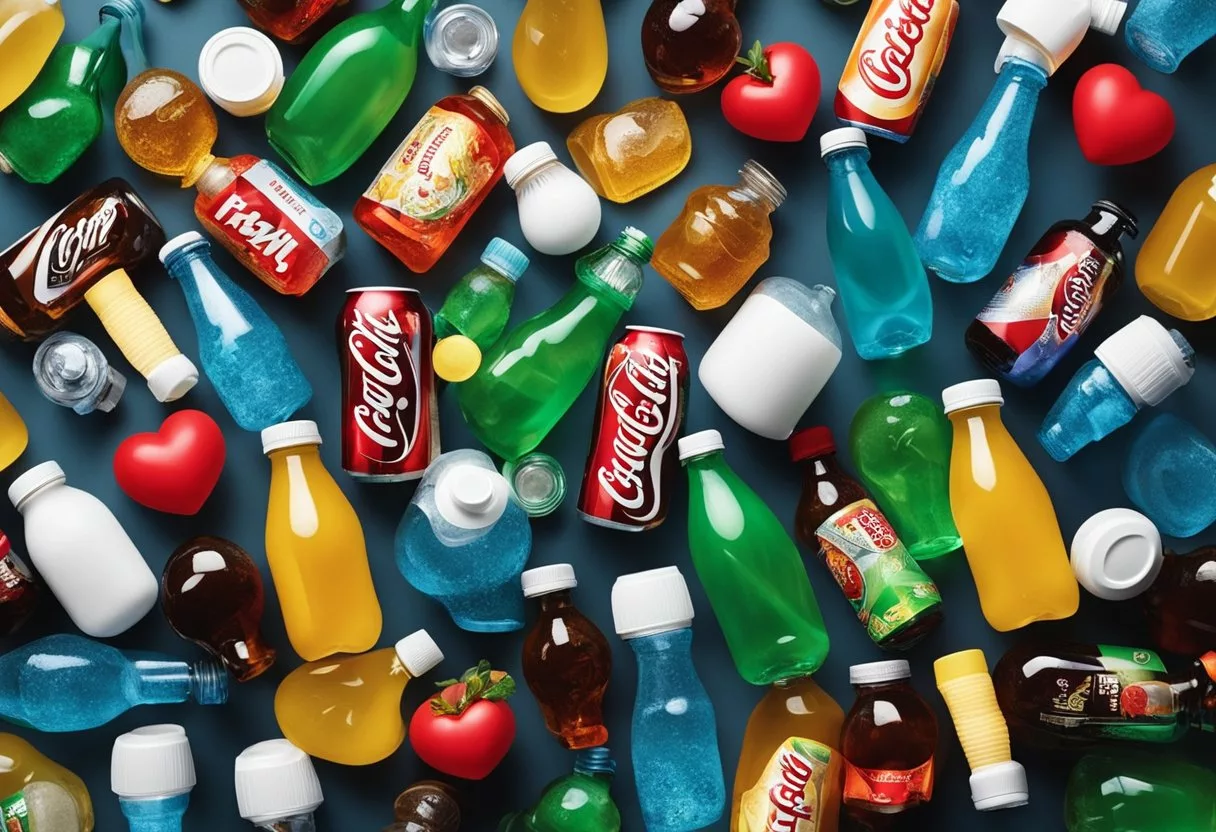Soda is a ubiquitous beverage that is consumed by people of all ages around the world. It is a popular choice for quenching thirst and satisfying cravings for something sweet. However, drinking soda every day can have a significant impact on your health. In this article, we will explore what happens to your body when you drink soda every day.

Soda is high in sugar and calories, and consuming it regularly can lead to weight gain and obesity. According to the Centers for Disease Control and Prevention, drinking soda frequently is associated with an increased risk of developing type 2 diabetes, heart disease, kidney disease, non-alcoholic liver disease, tooth decay, cavities, and gout. These health problems can be particularly concerning for individuals who consume soda on a daily basis.
In addition to the health risks associated with soda consumption, it can also have an impact on your energy levels and mood. Soda contains caffeine, which can cause a temporary increase in energy and alertness. However, this effect is short-lived and can lead to a crash later in the day. Furthermore, research has shown that consuming high amounts of sugar can lead to feelings of anxiety and depression.
Immediate Effects of Soda on the Body

When you drink soda, your body experiences a range of immediate effects. These effects can vary depending on factors such as the amount of sugar and caffeine in the drink, as well as your individual metabolism. In this section, we will explore some of the most common immediate effects of soda on the body.
Blood Sugar and Insulin Response
One of the most significant immediate effects of soda on the body is its impact on blood sugar and insulin levels. Within the first 10 to 15 minutes of drinking soda, the sugar in the drink is absorbed into the bloodstream, causing a rapid spike in blood sugar levels. This spike triggers the release of insulin, a hormone that helps to regulate blood sugar levels.
However, when you drink soda regularly, your body becomes less sensitive to insulin, which can lead to insulin resistance and type 2 diabetes. In fact, a study published in the Journal of the American Medical Association found that people who drank one or more sugar-sweetened beverages per day had a 26% greater risk of developing type 2 diabetes than those who drank less than one per month.
Short-Term Energy and Caffeine Impact
Soda also has a short-term impact on energy levels, thanks to its high sugar and caffeine content. The sugar in soda provides a quick burst of energy, while the caffeine in the drink can help to improve alertness and concentration.
However, this energy boost is short-lived and can quickly lead to a crash. Additionally, caffeine can cause a range of side effects, including jitters, anxiety, and insomnia.
Gastrointestinal Reactions
Finally, drinking soda can also cause a range of gastrointestinal reactions, including gas, bloating, and gut discomfort. This is because the carbonation in soda can cause gas to build up in the stomach, leading to bloating and discomfort.
In addition, the high sugar content in soda can also feed the harmful bacteria in your gut, leading to an imbalance in your gut microbiome. This can cause a range of digestive issues, including diarrhea, constipation, and inflammatory bowel disease.
Overall, the immediate effects of soda on the body can be significant and wide-ranging. From its impact on blood sugar and insulin levels to its effect on energy and gastrointestinal health, there are many reasons to think twice before reaching for that can of soda.
Weight Gain and Obesity

Drinking soda every day can lead to weight gain and obesity. This is because soda is a source of extra calories and sugar in the diet. According to EatingWell, “drinking soda frequently is associated with weight gain, obesity, type 2 diabetes, heart disease, kidney disease, non-alcoholic liver disease, tooth decay, cavities and gout.”
Caloric Intake and Sugar Content
A 16-ounce can of cola provides 207 calories and 51 grams of carbs, which is 17% of the daily value, according to Livestrong. These extra calories and sugar can contribute to weight gain and obesity if consumed in excess.
Appetite Changes and Cravings
Drinking soda can also cause changes in appetite and cravings. According to Healthline, “drinking too much diet soda may increase cravings for other sweet foods.” This can lead to consuming more calories than necessary, which can contribute to weight gain and obesity.
In addition, drinking soda can lead to the accumulation of belly fat, which is associated with an increased risk of obesity-related health problems such as heart disease and type 2 diabetes.
Overall, the caloric intake and sugar content of soda, as well as changes in appetite and cravings, can contribute to weight gain and obesity.
Long-Term Health Risks

Heart Disease and Blood Pressure
Drinking soda every day can increase the risk of heart disease and high blood pressure. According to a study published in the journal Circulation, people who drank more than one soda per day had a 20% higher risk of having a heart attack or dying from a heart attack than those who rarely drank soda. The study also found that those who drank more than one soda per day had a 20% higher risk of developing high blood pressure than those who rarely drank soda. The high sugar content in soda can lead to weight gain, which is a risk factor for heart disease.
Type 2 Diabetes and Insulin Resistance
Regular consumption of soda can contribute to the development of type 2 diabetes and insulin resistance. According to a study published in the journal Diabetes Care, people who drank one or more sugary drinks per day had a 26% higher risk of developing type 2 diabetes than those who rarely drank sugary drinks. The high sugar content in soda can cause insulin resistance, which can lead to type 2 diabetes. Insulin resistance occurs when the body’s cells become resistant to the effects of insulin, which is a hormone that regulates blood sugar levels.
Dental Health Concerns
Drinking soda every day can have negative effects on dental health. The high sugar content in soda can lead to tooth decay and cavities. According to a study published in the journal Biomimetics, drinking soda is associated with tooth decay, enamel erosion, and tooth loss. The acidic nature of soda can also contribute to dental erosion. It is important to note that diet soda can also have negative effects on dental health, as the acidic content can still contribute to enamel erosion.
Kidney Disease and Urinary Health
Drinking soda every day can also have negative effects on kidney function and urinary health. According to a study published in the Clinical Journal of the American Society of Nephrology, people who drank more than two servings of soda per day had a higher risk of developing chronic kidney disease than those who rarely drank soda. The high sugar content in soda can also lead to urinary tract infections, as the sugar can feed bacteria in the urinary tract.
In summary, drinking soda every day can have negative long-term health effects, including an increased risk of heart disease, high blood pressure, type 2 diabetes, insulin resistance, tooth decay, cavities, kidney disease, and urinary tract infections. It is important to limit consumption of soda and opt for healthier beverage options, such as water, tea, and coffee.
Metabolic Syndrome and Cardiovascular Health

Metabolic syndrome is a cluster of conditions that increases the risk of heart disease, stroke, and diabetes. One of the main causes of metabolic syndrome is a diet high in added sugars, such as those found in soda.
Cholesterol Levels and Heart Function
Regular consumption of soda has been linked to high levels of LDL (“bad”) cholesterol and low levels of HDL (“good”) cholesterol. This imbalance can lead to the buildup of plaque in the arteries, increasing the risk of heart disease. In fact, a study published in the Journal of the American Heart Association found that people who drank more than two servings of soda per day had a higher risk of dying from heart disease than those who drank less than one serving per month.
Inflammation and Cardiovascular Disease
Consuming soda on a regular basis can also lead to chronic inflammation, which is linked to a higher risk of cardiovascular disease. Inflammation occurs when the body’s immune system is activated in response to an injury or infection. However, when inflammation becomes chronic, it can damage the arteries and increase the risk of heart attack and stroke.
In conclusion, regular consumption of soda can contribute to the development of metabolic syndrome, which increases the risk of heart disease, stroke, and diabetes. It can also lead to high levels of LDL cholesterol, low levels of HDL cholesterol, and chronic inflammation, all of which are linked to a higher risk of cardiovascular disease. Therefore, it is recommended to limit or avoid soda consumption to maintain a healthy heart and prevent chronic diseases.
Bone Health and Acid Balance

Calcium Absorption and Osteoporosis
Calcium is an essential mineral for maintaining strong bones. Soda consumption has been linked to lower calcium intake and poor bone health. According to a study published in the American Journal of Clinical Nutrition, women who consumed more soda had lower bone mineral density and higher risk of osteoporosis.
Soda consumption may also affect calcium absorption. Phosphoric acid, found in many sodas, can interfere with calcium absorption in the body. This can lead to calcium depletion and weaken bones over time.
Phosphoric Acid and Bone Density
Phosphoric acid, a major component in most sodas, has been linked to lower bone density in some studies. According to a study published in the Journal of Nutrition, phosphoric acid may increase the risk of bone fractures in women.
Phosphorus itself is an important bone mineral. But if you’re getting too much of it from sodas, it can displace calcium in the bones and lead to weaker bones over time.
To maintain healthy bones, it’s important to consume adequate amounts of calcium and limit soda consumption. Drinking water and other calcium-rich beverages like milk can help maintain healthy bones.
Neurological Effects

Drinking soda every day can have negative effects on the brain and nervous system. Here are some of the potential neurological effects of consuming soda on a daily basis.
Brain Function and Mood Fluctuations
Soda contains high amounts of sugar and caffeine, which can lead to mood swings and fluctuations in brain function. According to a study published in the journal Nutrients, sugar-sweetened beverages can have negative impacts on brain health. The study found that consuming sugar-sweetened beverages can lead to decreased cognitive function and memory, as well as an increased risk of depression.
Caffeine is a stimulant that can affect the brain in several ways. It can increase alertness and improve cognitive function, but it can also cause irritability, anxiety, and sleep disturbances. Consuming large amounts of caffeine from soda can lead to these negative effects.
Sleep Disturbances and Adenosine
Soda can also disrupt sleep patterns by interfering with the production of adenosine, a neurotransmitter that helps regulate sleep. According to a study published in Eat This, Not That!, consuming caffeine from soda can lead to chemical changes in the brain that make it difficult to fall asleep and stay asleep.
Adenosine is a natural sedative that builds up in the brain throughout the day, promoting sleepiness at night. Caffeine blocks the action of adenosine, which can lead to sleep disturbances and insomnia. Drinking soda before bed can interfere with the natural sleep cycle and lead to poor quality sleep.
In conclusion, drinking soda every day can have negative effects on the brain and nervous system. It can lead to mood swings, cognitive decline, and sleep disturbances. To maintain optimal brain health, it is recommended to limit or avoid soda consumption and choose healthier options such as water, herbal tea, or fresh juice.
Gut Health and Microbiome

Impact on Gut Flora
Regular soda consumption can have a negative impact on gut health. The high sugar content in soda can feed harmful bacteria in the gut, leading to an imbalance in the microbiome. This can cause inflammation, digestive issues, and a weakened immune system [1].
On the other hand, some sodas marketed as “gut-healthy” contain prebiotic fibers that support the growth of beneficial bacteria in the gut. Inulin, a type of fiber found in some sodas, can promote the growth of beneficial bacteria, leading to a healthier microbiome [2].
Digestive System and Gut Lining
Soda consumption can also have negative effects on the digestive system and gut lining. The high sugar content in soda can cause inflammation in the gut lining, leading to conditions such as leaky gut syndrome. Additionally, the high acidity of soda can erode tooth enamel and cause acid reflux [3].
In conclusion, while some sodas may contain prebiotic fibers that support gut health, the negative effects of regular soda consumption on gut health and the digestive system cannot be ignored. It is important to limit soda consumption and opt for healthier beverage choices to maintain a healthy gut microbiome and digestive system.
Sources:
- Livestrong: What Really Happens to Your Body When You Drink Soda Every Day
- Dr. Hyman: The Truth About “Gut Healthy” Soda—How to REALLY Optimize Your Microbiome
- Healthline: 8 Potential Side Effects of Consuming Too Much Diet Soda
Nutritional Considerations and Alternatives

Comparing Diet and Regular Soda
Both diet and regular soda have negative impacts on the body. Regular soda is high in sugar, which can lead to weight gain, tooth decay, and an increased risk of type 2 diabetes and cardiovascular disease. Diet soda, on the other hand, contains artificial sweeteners which may be linked to negative health outcomes such as a higher risk of stroke and dementia [1].
While diet soda is marketed as a healthier alternative to regular soda, it is still important to limit consumption of both types of soda. Instead, individuals should aim to drink more water and other healthy beverages.
Healthy Hydration Choices
Water is the best choice for hydration, as it has no calories or added sugars. Sparkling water is also a good option for those who enjoy the fizziness of soda, but without the negative health effects. Kombucha is another alternative that has gained popularity in recent years, as it is a fermented tea that contains probiotics and antioxidants.
In addition to these options, individuals can also flavor their water with fruits or vegetables for a tasty and healthy alternative to soda. For example, adding cucumber or lemon to water can add flavor without any added sugars or calories.
Overall, it is important to be mindful of the beverages consumed on a daily basis. While soda may be a convenient and tasty option, it is not a healthy choice for regular consumption. Instead, individuals should aim to drink more water and other healthy beverages to support their overall health and well-being.
Regulatory and Dietary Guidelines

American Heart Association Recommendations
The American Heart Association (AHA) recommends that women limit their added sugar intake to no more than 6 teaspoons per day and men limit their added sugar intake to no more than 9 teaspoons per day. Drinking sugar-sweetened beverages, including soda, can contribute to exceeding these limits and increase the risk of developing heart disease, obesity, and type 2 diabetes.
USDA and CDC Guidelines
The United States Department of Agriculture (USDA) and Centers for Disease Control and Prevention (CDC) recommend that individuals limit their intake of added sugars to less than 10% of their daily calorie intake. For a 2000 calorie diet, this would be no more than 200 calories or 50 grams of added sugar per day. Drinking soda regularly can contribute to exceeding these limits and increase the risk of developing chronic diseases.
The USDA also recommends that individuals consume a variety of nutrient-dense foods from all food groups, including fruits, vegetables, whole grains, lean proteins, and low-fat dairy products. Drinking soda regularly can displace these nutrient-dense foods and contribute to an unbalanced diet.
In summary, regulatory and dietary guidelines from the AHA, USDA, and CDC recommend limiting intake of added sugars, including those found in soda, to reduce the risk of developing chronic diseases. Drinking soda regularly can displace nutrient-dense foods and contribute to an unbalanced diet.